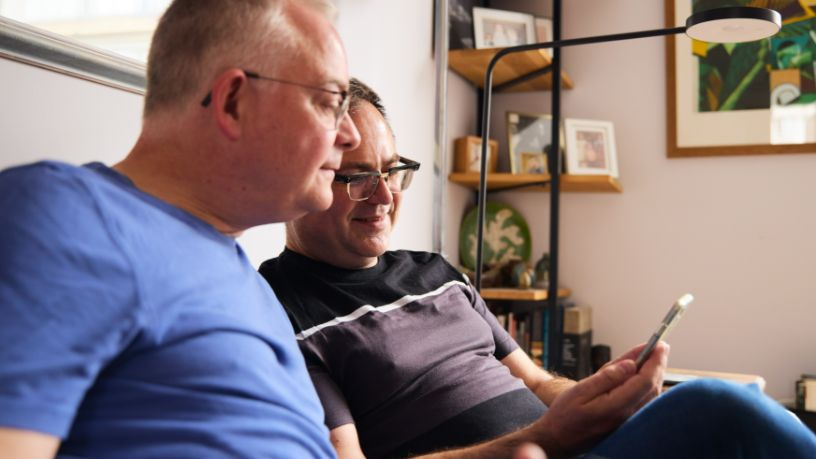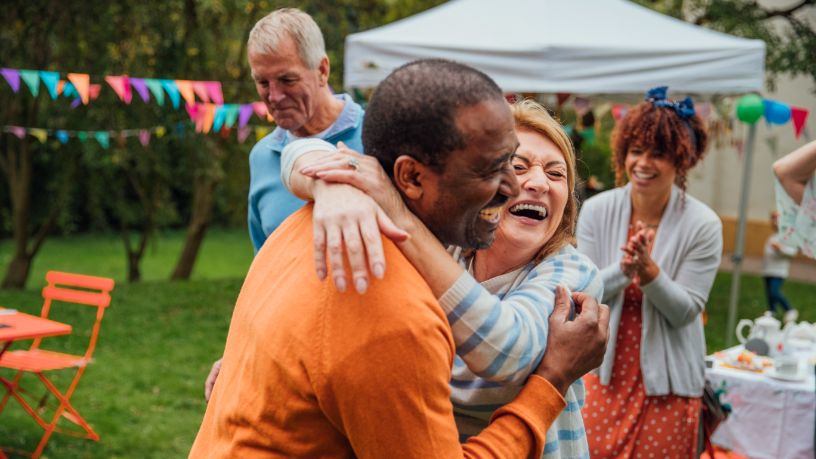Following a Bupa Health Check at her work, Jacqui learned that she had type 2 diabetes.
Key takeaways
After hitting a stumble, Jacqui let her condition control her life. But after putting in the hard work, she defied expectations by getting her diabetes into remission.
Managing type 2 diabetes often comes down to the choices you make. Discover Jacqui’s top tips for getting your health and happiness back on track.
I was diagnosed with type 2 diabetes in 2018 during a Bupa Health Check at work. It wasn’t a great shock. My grandmother, mum and sister all had the condition, and I was resigned to the fact that it would eventually happen to me too.
I was put on medication. I decided I’d make some lifestyle changes as well. I started walking to work, stopped drinking alcohol and watched what I ate. It worked. My medication dosage came down, and I started to feel better.
Then the Covid-19 pandemic hit, and I lost my way. Stuck at home, my husband Mark and I would have video calls with friends in the evening with a bowl of nuts and snacks. Every Friday, I’d have a bag of lollies. And my walking stopped almost completely because we couldn’t go out.
From diagnosis to creating a treatment plan
By 2022, I was taking 4 tablets a day for my diabetes, and my doctors were preparing to put me on insulin. Like my initial diagnosis 4 years earlier, I was resigned. My mum and sister were on insulin, and I thought that was going to be my life as well.
Around the same time, I’d heard about a new type 2 diabetes treatment plan. I attended a webinar, and afterwards I thought, why not? I had nothing to lose at that point, and my GP put my name forward as a candidate.
I didn’t know what to expect at my first treatment meeting, but a little voice inside my head told me I needed to give it a try. When asked what my weight loss goal was, I said I didn’t know. Losing weight wasn’t my main focus. My goal was to be in remission from diabetes. I wanted to be non-diabetic and prove everyone wrong (including myself), prove that this condition wasn’t an inevitable part of my life.
As well as structured eating, the treatment plan provided me with a lot of education about food, and even went into the psychology of why we eat the way we do. Historically, I had seen food as a reward on a good day and a comfort on a bad day. I spent all my time thinking about what I was going to eat. If I went out for a work lunch, I’d have 3 courses. Then, I’d go home and make a big dinner. I had no awareness of how much food I needed or how much exercise I could be doing to help my body stay healthy.
After years of very little exercise, I wasn’t about to run a marathon. I made small changes that made a big difference over time. Taking the stairs at work rather than the lift was a good place to start. As was parking at the back of the car park so I had further to walk to the shops. Or going out for a short walk after dinner rather than flopping in front of the TV.
It wasn’t easy. On Christmas Day, I ate soup with my family as they tucked into a full Christmas dinner. I remember thinking, "If I can sit here and do this today, I can achieve anything".
Member Health Programs
Discover health cover that's right for you with a range of personalised programs and services designed to support your health and wellbeing.
Leaning on support systems during recovery
My friends and family were my biggest supporters. Rather than go out for dinner, my friends and I would meet for coffee. My husband and I would still sit together and have dinner every night, but our meals weren’t the same. Everyone supported me because they wanted me to be healthy and happy.
On the tough days, I would remind myself how grateful I was to have the opportunity to change. And I refused to beat myself up if I had an off day where I just needed to sit on the couch.
About 4 months into my treatment plan, I had to go shopping. None of my clothes fit and even my belt wasn’t holding my jeans up anymore. I grabbed a size 16 and a size 14 pair of jeans, but that little voice in my head told me to get the size 12 too. I put them on first and they fit. The feeling was pure joy. It was the proof that I had achieved something, that all the hard work was worth it. And that I was changing in a positive way that was good for my health.
One year after starting the treatment plan, my blood glucose levels were in a healthy range. My doctors were astounded. I was living proof that you could send type 2 diabetes into remission.
Overcoming challenges with a positive mindset
The changes I’ve made have meant I now need fewer blood tests, and the number of pills I take for other health issues has been reduced. My annual eye appointment to check for retina damage, which is common among diabetics, showed I was low risk (so now I go every 2 years). I’m also sleeping better than I ever have.
I still go out and enjoy my life. If I have a big lunch, I’ll watch what I eat for dinner. I try to walk every day, I do yoga regularly, and I use a smartwatch to track my steps.
The biggest change has been my mindset. While I’ve always been bubbly, in the past I felt like I was hiding. Now, I’m more confident knowing that I’ve achieved this incredible result. When I have a good or bad day, I share the news with friends or go for a walk and appreciate what I have. I don’t reach for a chocolate bar anymore.
Jacqui's top tips to get well and stay well
- Start small. To begin your health and wellness journey, set realistic goals that you can build on. For instance, short walks, even just pottering around at home, can help you move more. I started by aiming for 3 10-minute walks every day. Very quickly, my goals became larger.
- Learn to love water. Drinking water will help keep your mind clear, your skin will look brighter and you’ll feel better overall. For a little variety, add some fresh mint or cucumber.
- Celebrate your wins. On tough days, I remind myself how it felt fitting into those jeans and hearing my doctor tell me I was no longer diabetic. Those memories remind me how far I’ve come, and keep me motivated to continue on.
- Be mindful. Learn about how much food should be on your plate and aim for that with every meal. It’s all about balance.
This personal story is not intended to represent that the individual has used or endorses any specific health practitioner or program. Everyone’s health journey is individual and health outcomes can vary from person to person.
This article is not a replacement for personalised and specific medical, healthcare or other professional advice. If you have any concerns about your health, see your doctor or another health professional.
Resources
Diabetes Australia offers resources on preventing and living with diabetes. Visit their website or call them on 1800 177 055.
The National Diabetes Services Scheme (NDSS) Peer Support is a space for people living through similar experiences to share their stories and support each other.

At Bupa, trust is everything
Our health and wellbeing information is regularly reviewed and maintained by a team of healthcare experts, to ensure its relevancy and accuracy. Everyone's health journey is unique and health outcomes vary from person to person.
This content is not a replacement for personalised and specific medical, healthcare, or other professional advice. If you have concerns about your health, see your doctor or other health professional.
You might also like...
Diabetes 101: What are the different types?
Understanding the different types of diabetes is an important step in learning how to manage your health and preventing serious issues in the future.
7 diabetes snack swaps to conquer cravings
Living with diabetes shouldn’t mean sacrificing snacks. Discover 7 healthy and filling swaps that are just as good as the originals.
6 diabetes friendly desserts
Just because you have diabetes doesn’t mean you always have to skip the sweet treats. Discover 6 easy and delicious diabetes friendly desserts.
What you shouldn't say to someone with type 2 diabetes
If your loved one has been diagnosed with type 2 diabetes, it can help to know what to say to them.





